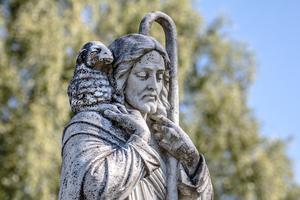You Are the Third Shepherd
User’s Guide to Sunday, May 7

Sunday, May 7, is the Fourth Sunday of Easter, Good Shepherd Sunday. Mass Readings: Acts 2:14, 36-41; Psalm 23:1-6; 1 Peter 2:20-25; John 10:1-10
Today is Good Shepherd Sunday, when Jesus says: “The shepherd calls his own sheep by name and leads them out.
“When he has driven out all his own, he walks ahead of them, and the sheep follow him.”
This describes the way shepherding works in the Church: Christ at the head, with leaders behind. It thus describes the three shepherds we need to be most concerned with: the shepherd in heaven, the shepherds on earth and the shepherd in the mirror.
Jesus is the model shepherd, who lays down his life for his sheep.
This is the greatness of Jesus Christ, our shepherd: He came to be with us so he could lead us, in person — even through death.
But today’s Psalm described him long before.
He is generous: “The Lord is my shepherd, I shall not want. In verdant pastors, he gives me repose. … You spread the table before me in the sight of my foes,” and “my cup overflows.”
He offers direction — “he guides me in right paths for his namesake” — and he keeps us safe: “Even though I walk in the dark valley, I fear no evil, for you are at my side.”
With Christ at the head, the Church provides secondary shepherds for us.
Today’s first reading introduces us to Peter, and in him we see all that any pope, bishop or pastor should be.
First, Peter is firm and unblinkingly honest. “Save yourselves from this corrupt generation,” he says, and he points his audience to “this Jesus whom you crucified.”
Second, Peter is clear. “Repent and be baptized, every one of you, in the name of Jesus Christ,” he says.
But for all that, Peter is encouraging, saying:
“You will receive the gift of the Holy Spirit. For the promise is made to you and to your children.”
After the Lord and the Church, there is a third shepherd we tend to forget: ourselves.
We, too, must lead — either by our authority or by our example. Today’s second reading says so explicitly: “Christ also suffered for you, leaving you an example that you should follow in his footsteps,” says St. Peter.
We should accept persecution like Jesus, St. Peter says: “If you are patient when you suffer for doing what is good, this is a grace before God. ... When he was insulted, he returned no insult.” We should also be honest, like the one who “committed no sin, and no deceit was found in his mouth.”
This is only possible for each of us because of Christ: “By his wounds you have been healed.”
It is ultimately only by being united to Jesus that any shepherd is effective. For “they will not follow a stranger; they will run away from him, because they do not recognize the voice of strangers.”
Tom Hoopes is writer in
residence at Benedictine College
in Atchison, Kansas.
He is the author of What
















